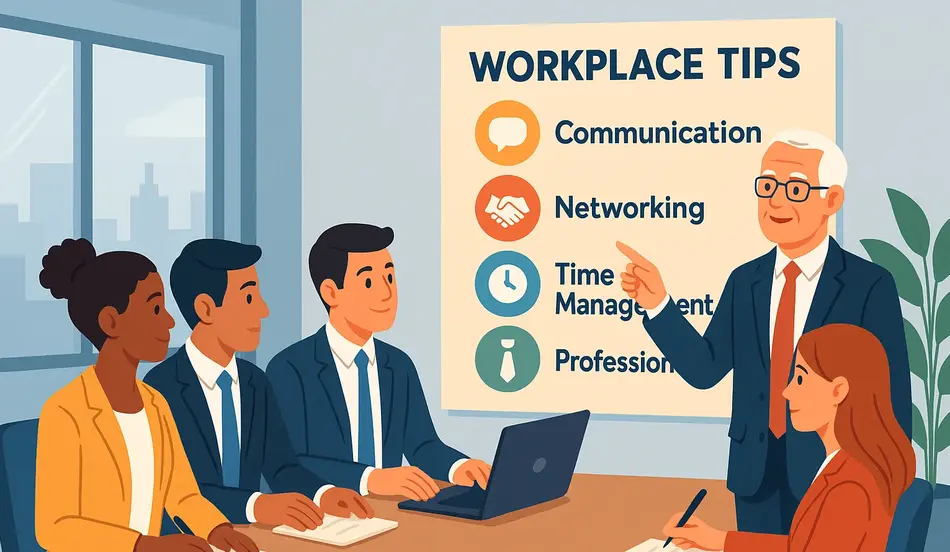Starting your first corporate job or transitioning to a new position can be both exciting and overwhelming. The corporate world operates with unwritten rules and expectations that aren’t taught in school but can significantly impact your career trajectory. This comprehensive guide provides practical workplace tips drawn from seven years of professional experience, including valuable insights from working in HR, that will help you navigate corporate environments with confidence.
Whether you’re a recent graduate entering the workforce or a professional making a career change, these essential corporate workplace tips will help you avoid common pitfalls and accelerate your professional growth.
Find the Top Performer and Make Them Your Mentor
On your first day in a new job, make it your mission to identify who the very best performer is at what you do. While companies typically assign buddies or managers during onboarding, these individuals might not be the top performers in your specific role.
How to Identify and Connect with Top Performers
- Observe who receives recognition during team meetings
- Ask your manager who they consider exemplary in your role
- Look for colleagues whose work is frequently referenced as a benchmark
- Request to shadow them to understand their workflow and approaches
- Study their communication style, time management, and problem-solving techniques
Research from Harvard Business Review shows that employees with mentors are promoted five times more often than those without mentors. By connecting with top performers, you gain access to institutional knowledge and best practices that might take years to discover on your own.
Master Your Company’s Communication Culture
Every organization has its unique communication style and preferences. Understanding and adapting to these norms quickly can significantly impact how your contributions are perceived.
Decoding Communication Preferences
- Observe whether your team prefers emails, messaging apps, or face-to-face conversations
- Note the level of formality in written and verbal communications
- Pay attention to response times and expected availability
- Learn the unspoken rules about meeting participation
- Understand when to copy others on communications
According to a study by McKinsey, employees spend approximately 28% of their workweek managing email and nearly 20% looking for internal information. Mastering your company’s communication protocols can save you significant time and prevent misunderstandings.
Need Career Advice?
Struggling with workplace challenges? Get personalized career guidance from industry experts.
Document Everything Important
In corporate environments, documentation is your best protection and learning tool. Developing strong documentation habits early in your career can prevent misunderstandings and create valuable reference materials.
What to Document and How
- Keep records of all performance conversations and feedback
- Document project requirements and scope changes
- Save important emails and decisions in an organized system
- Take detailed notes during meetings and training sessions
- Create personal process documents for recurring tasks
Consider using tools like Documentation Templates to streamline your documentation process and ensure you’re capturing all essential information.

Build Your Professional Network Intentionally
Your internal network within the company can be as valuable as your external professional connections. Building relationships across departments and hierarchies creates opportunities and support systems.
Strategic Networking Approaches
- Schedule coffee chats with colleagues from different departments
- Volunteer for cross-functional projects
- Participate in company social events and employee resource groups
- Offer help and expertise to colleagues facing challenges
- Connect with senior leaders through mentorship programs
Research from Career Community indicates that 85% of all jobs are filled through networking, highlighting the importance of building strong professional relationships both inside and outside your organization.
Understand the Unwritten Rules and Office Politics
Every workplace has unwritten rules and political dynamics that can significantly impact your career progression. Learning to navigate these effectively is essential for professional success.
Identifying and Navigating Office Politics
- Observe who influences decisions, regardless of their formal title
- Notice which behaviors are rewarded versus discouraged
- Understand alliances and relationships between teams
- Learn how credit is attributed for successful projects
- Recognize the preferred channels for sharing ideas and concerns
A study by the Center for Creative Leadership found that political savvy is one of the strongest predictors of career success, even outweighing job performance in some organizations. Developing this awareness early can help you navigate complex workplace dynamics effectively.
Take Ownership of Your Professional Development
While many companies offer training programs, the most successful professionals take personal responsibility for their growth and skill development.
Proactive Development Strategies
- Create a personal development plan with specific skill targets
- Seek regular feedback from managers and peers
- Request stretch assignments that build new capabilities
- Utilize company learning resources and tuition reimbursement
- Join professional associations related to your field
Check out WhatJobs career advancement opportunities to discover roles that align with your professional development goals and desired skill acquisition.
Hiring? Find Top Corporate Talent
Looking for professionals who understand workplace dynamics? Post your job openings on WhatJobs to reach qualified candidates.
Manage Your Personal Brand and Reputation
Your reputation within an organization can open or close doors to opportunities. Consciously managing how you’re perceived is a critical corporate skill.
Building a Strong Professional Reputation
- Consistently deliver on commitments and deadlines
- Communicate proactively about challenges or delays
- Present yourself professionally in appearance and communication
- Be mindful of your digital footprint on company platforms
- Demonstrate reliability and consistency in your work quality
According to research from WhatJobs Professional Development Center, 70% of employers use social media to screen candidates, and 57% have found content that caused them not to hire candidates. Your professional reputation extends beyond the workplace and into your online presence.

Understand the Business Beyond Your Role
Employees who understand how their work contributes to broader business objectives are more valuable and have greater career mobility.
Expanding Your Business Perspective
- Learn about your company’s business model and revenue streams
- Understand key performance indicators for your department and company
- Follow industry trends and competitive landscape
- Connect your daily tasks to organizational goals
- Develop financial literacy to understand business decisions
Professionals who can “speak the language” of different departments and understand business priorities are consistently rated as high-potential employees and are more likely to be considered for advancement opportunities.
Conclusion: Applying These Corporate Workplace Tips
Navigating the corporate world successfully requires more than just technical skills. By implementing these essential corporate workplace tips—finding top mentors, mastering communication norms, documenting important information, building strategic networks, understanding office politics, taking ownership of your development, managing your reputation, and developing business acumen—you’ll position yourself for long-term career success.
Remember that adapting to corporate culture is a continuous learning process. Be patient with yourself, remain observant, and consistently apply these principles to build a strong foundation for your professional journey.
Frequently Asked Questions
How quickly should I try to implement these corporate workplace tips when starting a new job?
When implementing essential corporate workplace tips, it’s best to take a gradual approach. During your first month, focus on observing the environment and identifying top performers. By month two, begin building your network and understanding communication norms. By month three, you should be actively documenting processes and developing your professional development plan. Remember that adapting to corporate culture is a marathon, not a sprint—consistent application of these workplace tips over time yields the best results.
What are the most common mistakes new professionals make when trying to navigate corporate workplace culture?
The most common mistakes when navigating corporate workplace culture include misreading the unwritten rules, failing to document important conversations, neglecting to build relationships across departments, and not seeking mentorship from top performers. Another critical error is focusing solely on technical skills while ignoring the importance of communication style and political awareness. These essential corporate workplace tips are often overlooked because they’re rarely taught in academic settings but are crucial for professional success.
How do I balance following corporate workplace tips with staying authentic to myself?
Balancing essential corporate workplace tips with authenticity involves understanding which aspects of corporate culture are non-negotiable (like documentation practices and communication norms) versus areas where your unique perspective adds value. The most successful professionals adapt their style to fit organizational expectations while maintaining their core values and strengths. Think of these corporate workplace tips as tools that help you express your authentic self more effectively within the organizational context, rather than as rules that require you to change who you are.
Which essential corporate workplace tip should I prioritize if I’m struggling with information overload?
If you’re experiencing information overload in a corporate environment, prioritize finding a top performer mentor. This single essential corporate workplace tip can streamline your learning curve dramatically. A mentor who excels in your role can help you filter which information is most important, which processes are critical versus optional, and how to navigate company-specific systems efficiently. Their guidance will help you focus your energy on high-impact activities rather than trying to master everything simultaneously.
How can I apply these corporate workplace tips if I work remotely?
Remote workers can apply these essential corporate workplace tips by being more intentional about their implementation. For finding mentors, schedule virtual coffee chats with top performers. For communication, pay extra attention to response times and formality in digital channels. Documentation becomes even more critical in remote settings—maintain detailed records of all decisions and conversations. For networking, actively participate in virtual team events and request introductions to colleagues in other departments. These corporate workplace tips require more deliberate effort in remote settings but remain equally valuable.
By implementing these essential corporate workplace tips, you’ll navigate your professional environment with greater confidence and effectiveness. Remember that mastering corporate dynamics is an ongoing process—continue to observe, adapt, and refine your approach as you grow in your career.
Looking for opportunities to apply these skills? Explore corporate positions on WhatJobs that match your career aspirations and newly developed workplace savvy.






